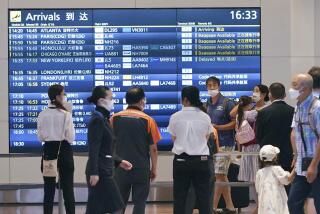Japanese Hint at Compromise on Rice, Major GATT Obstacle
- Share via
TOKYO — Japan strongly hinted today that it will agree this week to open its rice market somewhat to foreign suppliers, which would remove a key obstacle in worldwide trade negotiations.
Prime Minister Morihiro Hosokawa and other leaders seemed to be leaning toward accepting a compromise proposed by a subgroup of the General Agreement on Tariffs and Trade. It calls for Japan to accept imports for at least 4% of its rice market beginning in 1995, increasing to 8% over six years.
The implication is that import quotas would then be eliminated and replaced by tariffs, but this would be a matter for negotiation near the end of the six-year period, Chief Cabinet Secretary Masayoshi Takemura told reporters Tuesday morning.
“These are extremely harsh terms for our farmers,” Takemura said, but he added that “at least, there will be no tariffs imposed for six years. The basic policy of domestically producing the rice Japan consumes will not change significantly.”
Tokyo’s ban on foreign rice--with the exception of emergency imports during crop shortfalls, as was the case this year--has been a key point of conflict in the current Uruguay Round of GATT negotiations. Japan’s acceptance of the GATT proposal on rice could go a long way toward helping to bring the talks to a successful conclusion by the Dec. 15 deadline.
Any opening of Japan’s rice market is bitterly opposed by that country’s politically powerful farmers.
The Japanese consume about 10 million tons of rice yearly.
Tokyo now appears to have given up on winning further concessions in the details of a compromise agreement. After discussing the GATT proposal Tuesday morning with leaders of the seven parties that make up Japan’s ruling coalition, Hosokawa told reporters he had informed his colleagues that there was “no room to modify” the draft proposal.
More to Read
Sign up for Essential California
The most important California stories and recommendations in your inbox every morning.
You may occasionally receive promotional content from the Los Angeles Times.











